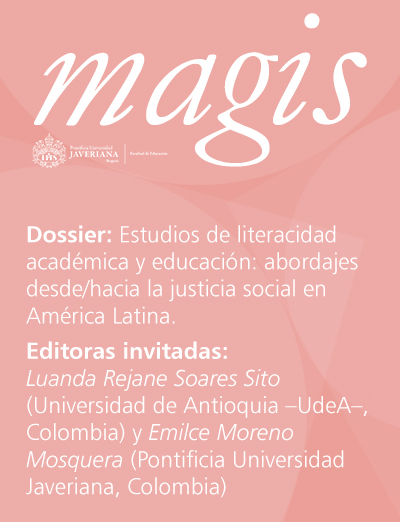Resumen
El currículo, como producto sociohistórico, no es solo un organizador de experiencias escolares, sino también un mecanismo de control utilizado, en algunos casos, para legitimar y promover culturas hegemónicas. Desde esta perspectiva, el propósito de la investigación es discutir, a la luz de los estudios decoloniales, una experiencia de alfabetización académica con miras a la flexibilidad curricular y a la propuesta de un currículo decolonial. Esta investigación cualitativa sigue los procedimientos de la investigación-acción y la etnografía crítica. Los datos del estudio se generaron en un curso de extensión dirigido a estudiantes universitarios autodeclarados indígenas, pertenecientes a una institución pública brasileña. Los resultados del análisis indican que la selección de organizadores didácticos, la transdisciplinariedad, la desterritorialización de los espacios de aprendizaje y el replanteamiento del tiempo son aspectos relevantes para la construcción de un plan de estudios universitario decolonial.
André, M. E. D. A. (1995). Etnografia da prática escolar. Papirus.
Apple, M. (1982). Ideologia e Currículo. Brasiliense.
Apple, M., & Buras, K. (2008). Respondendo ao conhecimento oficial. Em M. Apple, & K. Buras. (Orgs.). Currículo, poder e lutas: com a palavra, os subalternos (pp. 273-285). Artmed.
Aumont, J. (1993). A imagem (E. dos S. Abreu & C. C. Santoro, Trads.). Papirus.
Bakhtin, M. (2011). Estética da criação verbal. (6 ed.). Martins Fontes.
Barton, D., Hamilton, M., & Ivanic, R. (2000). Situated literacies: reading and writing in context. Routledge. https://doi.org/10.4324/9780203984963
Bhabha, H. (1998). O local da cultura. Editora UFMG.
Candau, V. M. F. (2020). Diferenças, educação intercultural e decolonialidade: termas insurgentes. Revista Espaço do Currículo, 13, 678-686. https://doi.org/10.22478/ufpb.1983-1579.2020v13nEspecial.54949
Castro-Gomes, S. (2007). Decolonizar la universidad. La hybris del punto cero y el diálogo de saberes. Em S. Castro-Gomes, & R. Grosfoguel. El giro decolonial: reflexiones para una diversidad epistémica más allá del capitalismo global (pp. 79-91). Siglo del Hombre Editores; Universidad Central, Instituto de Estudios Sociales Contemporáneos y Pontificia Universidad Javeriana, Instituto Pensar.
Cusicanqui, S. (2010). Ch’ixinakax Utxiwa: una reflexión sobre prácticas y discursos descolonizadores. Tinta Limón.
Devitt, A. J., Reiff, M. J., & Bawarshi, A. (2004). Scenes of writing: strategics for composing with genres. Longman.
Erickson F. (1987). Transformation and school success: the politics and culture of educational achievement. Anthropology & Education Quarterly, 18(4), 335-356. https://doi.org/10.1525/aeq.1987.18.4.04x0023w
Erickson, F. (1990). Qualitative methods in research on teaching. Em M. C. Wittrock, (Org.). Handbook of research on teaching (pp. 119-161). Macmillan.
Freire, P. (2017). Pedagogia do Oprimido. (64 ed.). Paz e Terra.
Giroux, H., & Simon, R. (2011). Cultura popular e pedagogia crítica: a vida cotidiana como base para o conhecimento curricular. Em A. F. Moreira, & T. Tadeu. (Orgs.). Cultura, currículo e sociedade (pp. 107-140). (12 ed.). Cortez.
Haesbaert, R. (2009). O mito da desterritorialização: do “fim dos territórios” à multiterritorialidade. (4 ed.). Bertrand Brasil.
Hernández Zamora, G. (2019). De los nuevos estudios de literacidad a las perspectivas decoloniales en la investigación sobre literacidad. Íkala, Revista de Lenguaje y Cultura, 24(2), 363-386. http://doi.org/10.17533/udea.ikala.v24n02a10
Hyland, K. (2004). Disciplinary discources: social interactions in academic writing. University of Michigan Press. https://doi.org/10.3998/mpub.6719
Ivanič, R. (1998). Writing and identity: the discoursal construction of identity in academic writing. John Benjamins.
Janks H. (2017). Critical literacy and the social justice project of education. English Teaching: Practice and Critique, 16, 114-132. http://doi.org/10.1108/ETPC-09-2016-0111
Janks H. (2019). The decolonization of higher education in South Africa: Luke’s writing as gift. Curriculum Inquiry, 49, 230-241. https://doi.org/10.1080/03626784.2019.1591922
Krenak, A. (2022). Futuro ancestral. Companhia das Letras.
Lillis, T. (1999). Whose “common sense”? Essayist literacy and the institutional practice of mystery. Em C. Jones, J. Turner, & B. V. Street (Eds.), Students writing in the university: Cultural and epistemological issues (pp. 127–140). John Benjamins.
Lillis, T. (2008). Ethnography as Method, Methodology, and “Deep Theorizing”. Closing the Gap Between Text and Context in Academic Writing Research. Written Communication, 25, 353-388. https://doi.org/10.1177/0741088308319229
Lillis, T. (2019). ‘Academic literacies’: sustaining a critical space on writing in academia. Journal of Learning Development in Higher Education, 15. https://doi.org/10.47408/jldhe.v0i15.565
Lopes, A. C., & Macedo, E. (2011). Teorias de currículo. Cortez.
Luke, A. (2018). Critical literacy, schooling and social justice: The selected works of Allan Luke. Routledge. https://doi.org/10.4324/9781315100951
Mignolo, W. (2008). Desobediência epistêmica: a opção descolonial e o significado de identidade em política. Cadernos de Letras da UFF – Dossiê: Literatura, língua e identidade, 34, 287-324.
Mignolo, W. (2017). Colonialidade: o lado mais escuro da modernidade. Trad. Marco Oliveira. RBCS, 32 (94), junho, 1-18. https://doi.org/10.17666/329402/2017
Oliveira, M. S. (2020). Aprendendo a ler para escrever: o gênero textual resumo científico e letramento acadêmico. Revista da ANPOLL, 51, 125-138. https://doi.org/10.18309/anp.v51i2.1386
Oliveira, M. S., Tinoco, G. A., & Santos, I. B. A. (2014). Projetos de letramento e formAÇÃO de professores de língua materna. EDUFRN.
Pennycook, A. (2006). Uma lingüística aplicada transgressiva. Em L. P. Moita Lopes (Orgs.). Por uma lingüística aplicada indisciplinar (pp. 67-84). Parábola.
Prior, P. (2003). Tracing process: how texts come into being. Em P. Prior, & C. Bazerman, What writing does and how it does it: an introduction to analyzing texts and textual practices (pp. 167-200). Lawrence Erlbaum Associates.
Quijano, A. (1992). Colonialidad y Modernidad/Racionalidad. Perú Indígena, 13(29), 11-20.
Santos-Marques, I. B. A., & Kleiman, A. (2019). Projetos, oficinas e práticas de letramento: leitura e ação social. Revista de Comunicação e Cultura do Seridó - ComSertões. 7(1), 16-34. https://doi.org/10.36943/comsertoes.v7i1.7275
Sito, L., & Kleiman, A. (2017). “Eso no es lo mío”: un análisis de conflictos en la apropiación de prácticas de literacidad académica. Universitas Humanística, 83, 159-185. http://dx.doi.org/10.11144/Javeriana.uh83.acap
Street, B. (1984). Literacy in theory and practice. CUP.
Street, B. (2010). Dimensões “escondidas” na escrita de artigos acadêmicos. Perspectiva, 28(2), 541-567. https://doi.org/10.5007/2175-795X.2010v28n2p541
Thiollent, M. (2011). Metodologia da pesquisa-ação. Cortez.
Walsh, C. (2013). Introducción. Lo pedagógico y lo decolonial: Entretejiendo caminhos. Em C. Walsh (Org.). Pedagogías decoloniales: prácticas insurgentes de resistir, (re)existir y (re)vivir (pp. 23-68). Abya Yala.

Esta obra está bajo una licencia internacional Creative Commons Atribución 4.0.
Derechos de autor 2025 Dayveson Noberto da Costa Pereira, Maria do Socorro Oliveira



